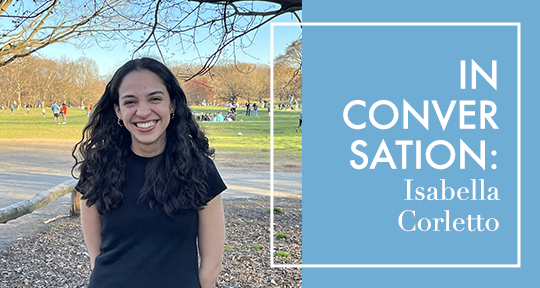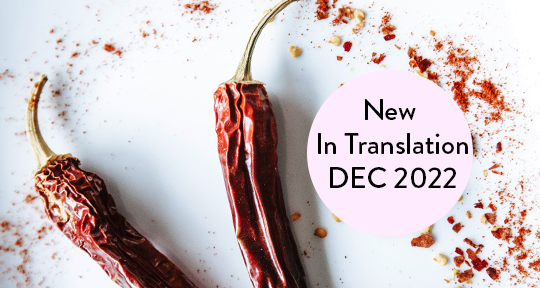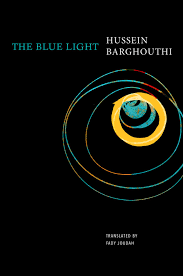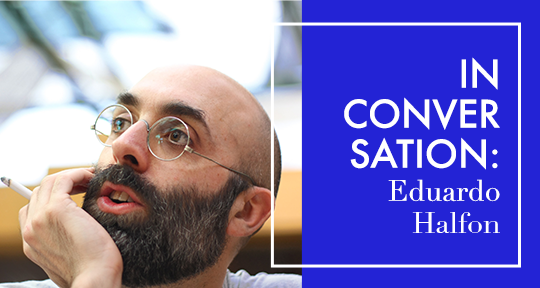By 2004, Guatemalan writer Eduardo Halfon had published three books: one about the life and death of Guatemalan painter Carlos Valenti; one about Miguel de Cervantes; one about how writers become writers. Four years later, he released a book of short stories called El boxeador polaco (The Polish Boxer, Editorial Pre-Textos), which inaugurated a new era for him as a writer. The book became an earthquake, and its ripples can still be felt today—nearly ten books later. Its stories went on to expand into novels, their themes and ideas forming a continual thread through the author’s prolific oeuvre, acknowledging the truth that stories, just like life, must be built on what came before. Canción, his latest book to be translated into English (Bellevue Press), borrows characters, plot lines, and entire sections from Signor Hoffman and Mañana nunca lo hablamos, books he published seven and eleven years ago respectively.
Because of this continuity and rehashing of stories, Eduardo’s body of work has often been referred to as a novela en marcha—an ongoing novel. It’s important to note that all of these stories share the same narrator: a Guatemalan author, former engineer, and chain-smoker named Eduardo Halfon, who shares many of the same experiences of real-life Eduardo. It seems all part of an intricate plan—though it’s everything but. Doubt, silence, contradiction, el no sé—not knowing— improvisation, and uncertainty: those are the many hands that pile one on top of another “to dominate” Eduardo’s writing.
In Canción, out last month and masterfully translated from Spanish by Lisa Dillman and Daniel Hahn, Eduardo tells the story of his Lebanese grandfather, also named Eduardo Halfon, and the time the Guatemalan guerrillas kidnapped him in 1967. In this impactful and luminous novel, we read about the Guatemalan Civil War—its violence, fear, and, again, the uncertainty. We get glimpses, and nothing else, of the actual kidnapping. We get glimpses, and nothing else, of the time Eduardo’s grandfather was in captivity. Because that’s also part of Halfon’s remarkable style: silence, mystery, darkness.
Recently I spoke with Eduardo about all of that. About Canción, about his novela en marcha, about some of his most memorable characters. We talked about writing in the dark. About the engineering behind a story. We talked about what’s real and the truth. About memory, childhood, silences, and, again—and as always—about not knowing and how important it’s for him to blur the lines between himself and his narrator. We talked, we exchanged emails, voice notes, and messages, and he replied from Guatemala City, Mexico City, Spain, and Germany. As anticipated, after reading Canción and yet again talking to Eduardo about his book, I have more questions than answers.
José García Escobar (JGE): With Canción, it’s the first time I’ve seen you address Guatemalan history so thoroughly in a book. Naturally, you had to mention some events and people because they were relevant to your grandfather’s kidnapping; others, however, seem to be part of the story’s background (Jacobo Árbenz, the 1954 CIA-backed coup, the rise of the guerrilla movement in the 1960s, Julio Ramírez Arteaga). How did that weaving come to be—between foregrounding or backgrounding history?
Eduardo Halfon (EH): When you’re writing a story that’s part of a historical account, that history has to be believable. In the case of Canción, that means its historical background, the Guatemalan Civil War, and the country’s recent history. I needed to investigate all of that, and I felt like I had to include it more for the feeling than for the facts. Some details are in the background—they’re props, so to speak—and some details are part of the story. That weaving is very organic, though. There’s no premeditation. It’s just a feeling of what should be where on the stage. What should be in the foreground. What should be in the background. It’s a very natural process of selection and placing. READ MORE…










Compass and Rifle: On Roque Dalton’s Stories and Poems of a Class Struggle
No one escapes Dalton’s inquisitive pen . . .
Stories and Poems of a Class Struggle by Roque Dalton, translated from the Spanish by Jack Hirschman, Seven Stories Press, 2023
On Thursday, July 6, 2023, the inaugural day of Guatemala’s International Book Fair (FILGUA), the government of El Salvador requested organizers to exclude Salvadoran author Michelle Recinos’ Sustancia de hígado (F&G Editores) from the fair. The next day, online news outlet elfaro revealed that El Salvador’s ambassador in Guatemala had said, “It would’ve been an unpleasant thing for the government of El Salvador if this book had been a part of the fair.” Details are scarce, but presumably, this action was related to Michelle’s story Barberos en huelga, winner of the 2022 Mario Monteforte Toledo Prize, which openly criticizes sitting president Nayib Bukele’s war on gangs.
Hearing this, I can only imagine what Roque Dalton would have written about Bukele.
Roque Dalton’s Historias y poemas de una lucha de clases (Stories and Poems of a Class Struggle) dates back to 1975, and remains as timely as ever. In a time when most Central American countries are under authoritarian regimes and have experienced backslides of democracy, the life and work of Roque Dalton is at once a beacon of hope, an inspiration, and a warning sign. Historias y poemas de una lucha de clases is a book filled with courageous testimony, the poet’s typical dry humor, and bone-chilling depictions of state violence. Here, Dalton is hyperaware of the pain and plight of his compatriots, but in addition to his typical grittiness and social critique, we also find tenderness, softness, beauty, and frailty; Dalton’s acute perception is both a rifle and a compass, manifesting in words of both rebuke and encouragement.
READ MORE…
Contributor:- José García Escobar
; Language: - Spanish
; Place: - El Salvador
; Writers: - Alaíde Foppa
, - Carlos Fonseca
, - Ernesto Cardenal
, - Jack Hirschman
, - Jaime Barba
, - Julio Delfos Marín
, - Luis de Lión
, - Luis Melgar Brizuela
, - Margaret Randall
, - Michelle Recinos
, - Otto René Castillo
, - Roque Dalton
; Tags: - authoritarianism
, - Central American literature
, - class struggle
, - elfaro
, - F&G Editores
, - fascism
, - FILGUA
, - Mario Monteforte Toledo Prize
, - Salvadoran literature
, - Salvadoran poetry
, - Seven Stories Press
, - social commentary
, - social critique
, - state violence